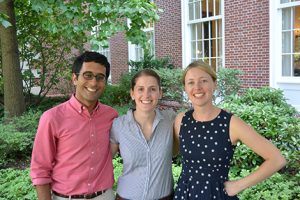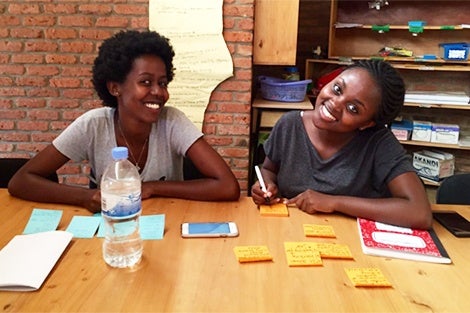December 20, 2016—The online character Juliet, a middle-aged nurse, was intended to be a comforting presence on a website for Rwandan adolescent girls seeking information about reproductive health. But when a team of alumni and students from Harvard T.H. Chan School of Public Health presented the character to the Rwandan youth designers volunteering for their project, the teens had other ideas for Juliet. Through their collaboration, she was made over into Mutoni (Rwandan for “precious”), a younger and stylish professional woman who interacts with girls on a smartphone-savvy platform.
The researchers were thrilled to see the teens run with the idea and make it their own. The project—Cybergirl—was the brainchild of Rebecca Hope, MPH ’14, Shannon Milroy, SM ’15, and Majdi Osman, MPH ’14, who founded a nonprofit called YLabs in 2014. Their focus is improving sexual and reproductive health, mental health, and HIV outcomes—the three biggest sources of mortality and morbidity among teens in developing countries.

While some adolescent health programs may hold focus groups for teens early in the development process, YLabs takes their involvement a step farther. They involve the teens throughout the design and implementation of all of their projects. In addition to Cybergirl, other innovations include YBank, a program in Rwanda that provides teens with small financial incentives, financial literacy training, and peer support to adhere to HIV treatment.
“The youth population today is the largest the planet has ever seen, but not a lot of attention is paid to adolescent health,” said Hope. “We’re seeing improvements in younger children’s health globally, but things are not changing for teenagers.”
“Our vision is to see a transformation in how we do adolescent health,” Osman said, “and to really listen to young people.” The team follows an approach known as human-centered design—common in the tech world but new in public health—that seeks the users’ perspective at all stages of the development process and aims to “fail fast, iterate, and learn” by prototyping early ideas with users, Osman said.
Based on young people’s input, they refine these rough concepts into a final solution with potential for impact. Other practitioners are taking notice, and attending YLabs workshops, one of which was held last spring during the Harvard Chan School’s annual State of Global Health conference.
Winning a Gates Grand Challenge award
Hope and Osman, both physicians experienced in adolescent health, and Milroy, a health economist, developed YLabs through the Venture Innovation Program at the Harvard Innovation Lab, before receiving funding to launch in 2015 from Child Relief International, and Pam Omidyar, co-founder of the Omidyar Network. This fall, they were awarded a Gates Grand Challenges Exploration grant from the Bill & Melinda Gates Foundation—which provides an initial $100,000 and the opportunity to apply for follow-up funding of up to $1 million—for their new initiative, Men Stand Up: Engaging Young Men in Family Planning Decisions.
Men are often left out of the policy conversation around reproductive health because they are seen as the source of the problem, Hope said. “What we’re hearing from youth we work with is that boys have to be part of the solution.”
For the Men Stand Up project, the team will work with young men in India and Kenya to get their perspectives on issues such as contraception and myths around pregnancy and family planning. They will also partner with VOTO Mobile and consulting firm FSG to survey young men on their mobile phones in Mali and Nigeria. The aim is to ultimately design new technologies and service delivery approaches that are grounded in young men’s needs and perspectives.
Over the past two years, YLabs has grown into a team of researchers from the U.S., U.K., Rwanda, Senegal, and India. They also offer internships to Harvard Chan students.
The founders see providing opportunities for students as one way to pay back the School for the support they received from their mentors. They included Jacqueline Bhabha, professor of the practice of health and human rights, Teresa Chahine, a researcher in the Center for Health and the Global Environment, and Judith Palfrey, professor in the Department of Social and Behavioral Sciences, all of whom sit on the YLabs Advisory Board. These researchers provided key support to YLabs’ development, from access to meeting spaces and contacts, to guidance on the team’s business plan and approach to adolescent health. Wafaie Fawzi, Richard Saltonstall Professor of Population Sciences Professor of Nutrition, Epidemiology, and Global Health and chair of the Department of Global Health and Population, supported opportunities for YLabs to engage with the School through running workshops and offering educational opportunities for students.
Photos: Courtesy of YLabs
